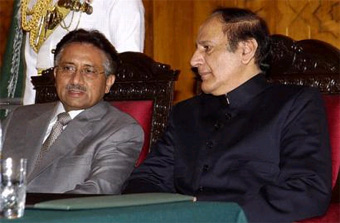 It is a sign of the times that supercilious, self-important public servants are finally being made to trudge to the Supreme Court and make an appearance.
It is a sign of the times that supercilious, self-important public servants are finally being made to trudge to the Supreme Court and make an appearance.Yesterday in the Missing Persons Case, Defence Secretary Kamran Rasool and National Crisis Management Cell director-general Brigadier Javed Iqbal Cheema both showed up before the three-member Supreme Court investigating the ‘mysterious’ disappearance of scores of Pakistani citizens. The Secretary for the Interior excused himself from appearing on grounds of ill-health and the Attorney General, playing true to form, remained missing as has now become routine.
The regime officials informed the court that 56 individuals on the HRCP list of 136 had been traced. Of them, 45 had been freed, three were under trial, five under custody, one detained under the Security of Pakistan Act, one was an army deserter and one had been convicted. However, according to Brigadier Cheema, 80 people were still ‘untraced’.
Not true said the Human Rights Commission of Pakistan (HRCP), as The Nation reported:
The HRCP lawyers Fakhruddin G Ibrahim and Asma Jahangir doubted the claims made by Brig Cheema about the 45 ‘free persons’ as according to HRCP’s information, these people were still missing.
The Nation then continued:
…Brig Cheema informed the court that rest of the people mentioned in the list could not be traced since the list provided by the HRCP “is very scanty and deficient of details, like parentage and addresses of the missing persons.”
Human Rights Activist, lawyers Asma Jahangir argued before the court that the addresses of those persons were intentionally not provided, since the families of those missing individuals had secretly contacted them (HRCP) and were afraid of being harassed by the “powerful intelligence agencies.”
…Defence Secretary Kamran Rasool, while defending the intelligence agencies told the court, “agencies denied that people have been picked up unlawfully.”
Justice Javed Iqbal asked the Defence Secretary about the procedure that intelligence agencies follow. “How are they (agencies) answerable to you and at what point they inform you about any individual being picked up. Where is that law according to which people have been picked up,” Justice Javed Iqbal questioned.
Defence Secretary informed the court that Defence Ministry is unaware of the operational activities of the intelligence agencies and was only controlling the administrative side of them.
…Advocate Ikram Chaudhry told the court that the persons who had been released were constantly threatened by the agencies, and that they could again be abducted if they tried to reveal any such information about their unconstitutional detention.
While denouncing Brig Cheema, Advocate Ikram Chaudhry said, “They are not as innocent and straight as they are portraying before you. They have played hell with the citizens of Pakistan.”
The truth be told is that it is widely suspected that for the past few years the state has been managed by Musharraf by means of his ‘secret agencies’. And, the people that run these agencies are not accustomed to being answerable to anyone but the army chief.
Just take the latest example.
On Thursday Dato Param Cumaraswamy, head of the International Commission of Jurists’ (ICJ) mission to Pakistan, informed the press that on 9 March, after the Chief Justice’s release from his prolonged incarceration at the Army Camp and subsequent denial of access to his office at the Supreme Court, the ICJ has learnt:
“that when the Chief Justice reached his residence, 18 intelligence agents were reportedly inside the house, his housekeepers had been sent home and his phone and cable lines were disconnected. His cars were also fork lifted and taken away.”
While the Supreme Court has now:
- hinted at giving a ruling in the missing persons’ case which would not only punish the guilty but also guide parliament to frame a law to rein in intelligence agencies.
- indicated that whosoever was found responsible for disappearances would have to answer for each day of confinement of the missing persons.
It is obviously going to be a tough call for the judges. These agencies, having run unchecked for thirty odd years, are unlikely to cede their ‘sovereignty’ so easily.
However, we should all back our Courts to the hilt, with the sincere hope that one day Pakistan will return to the care of its 'uniformless' citizens.
















